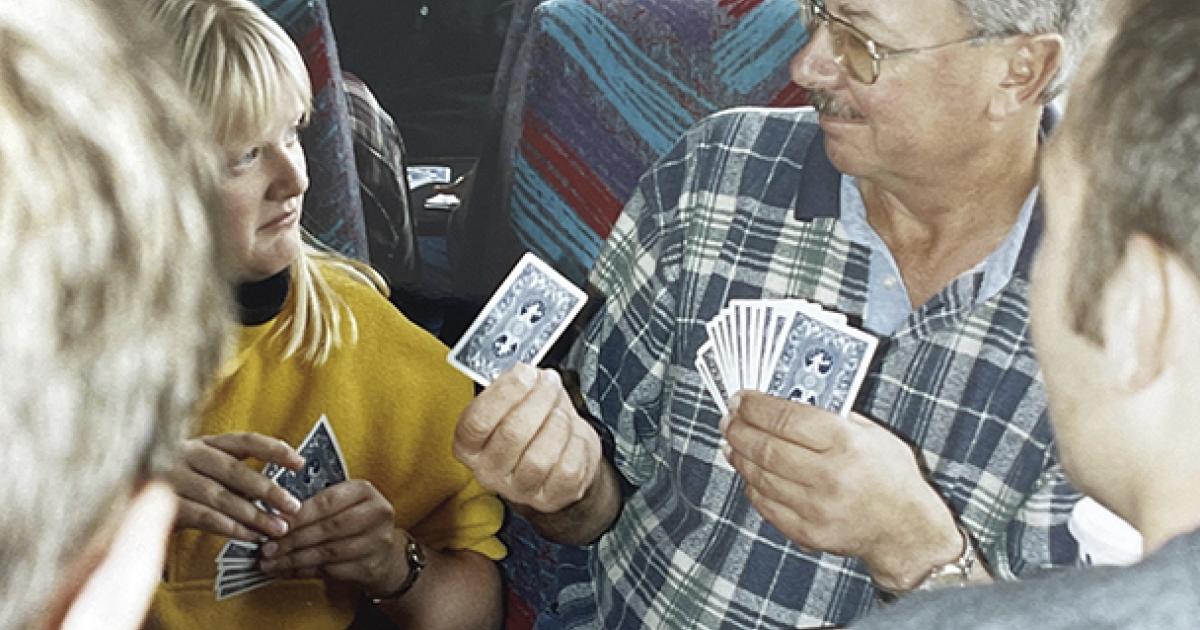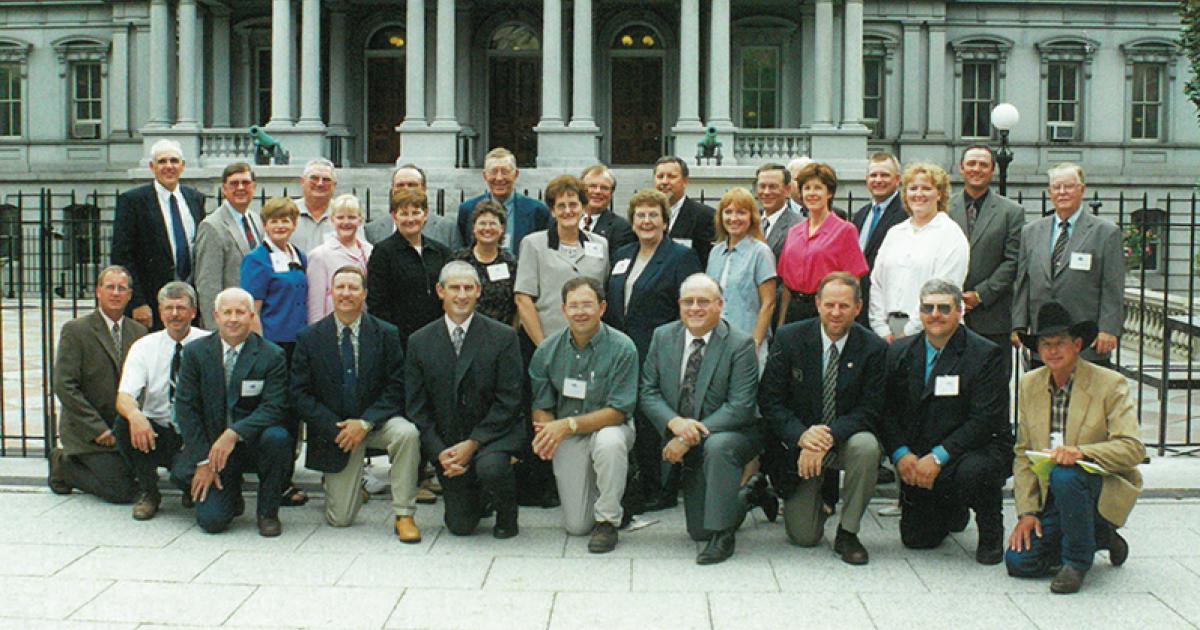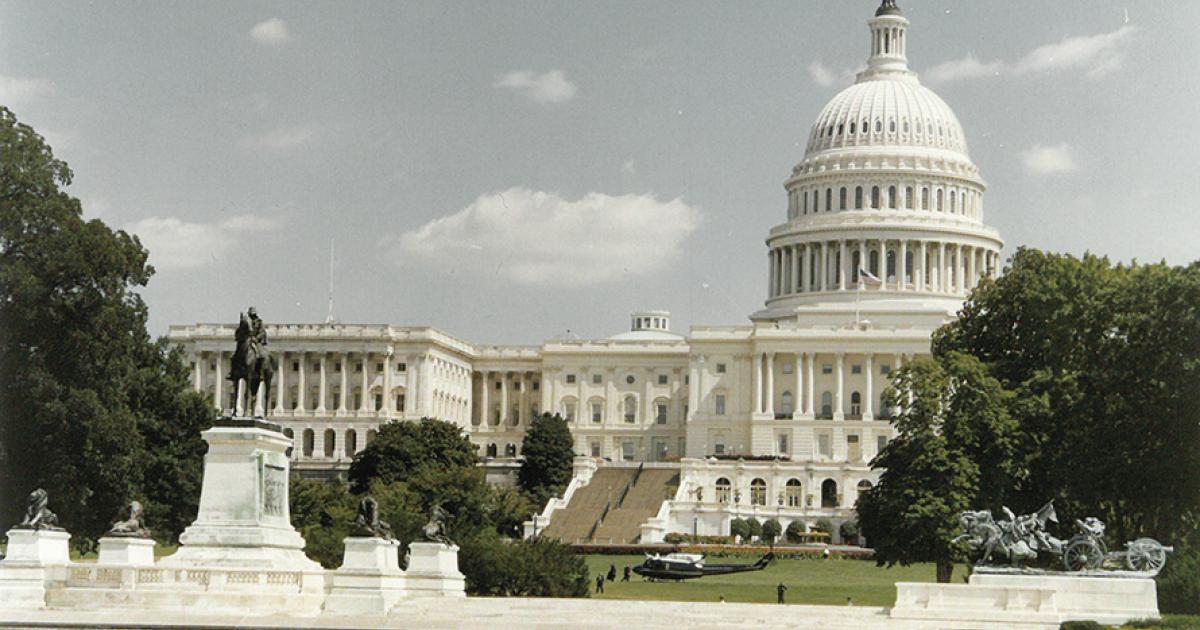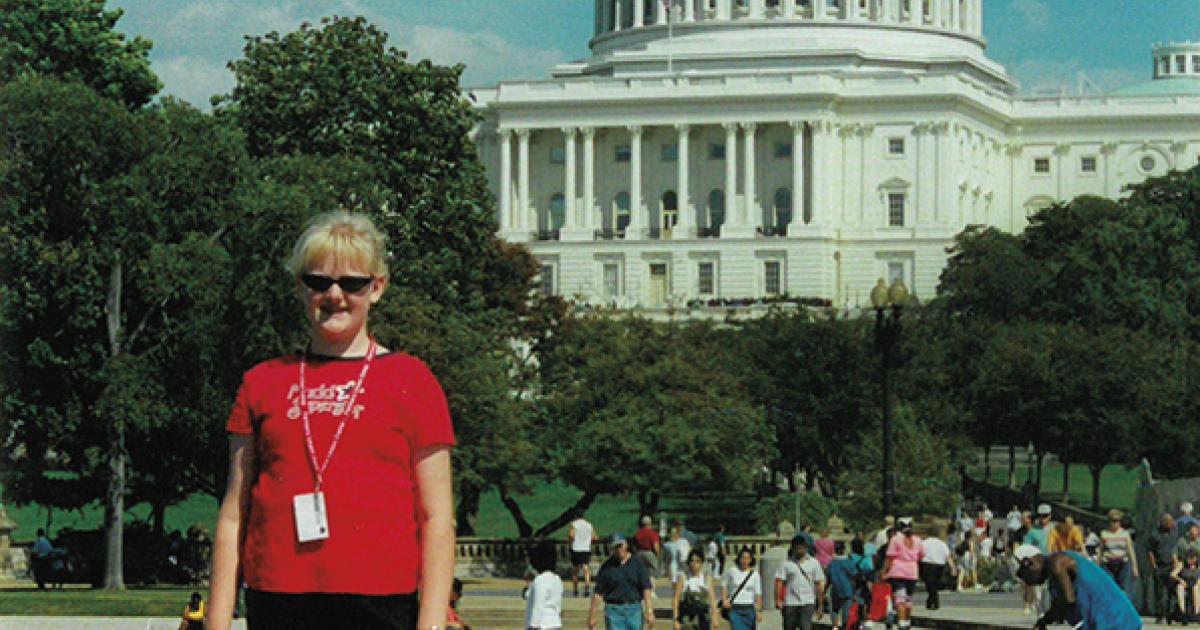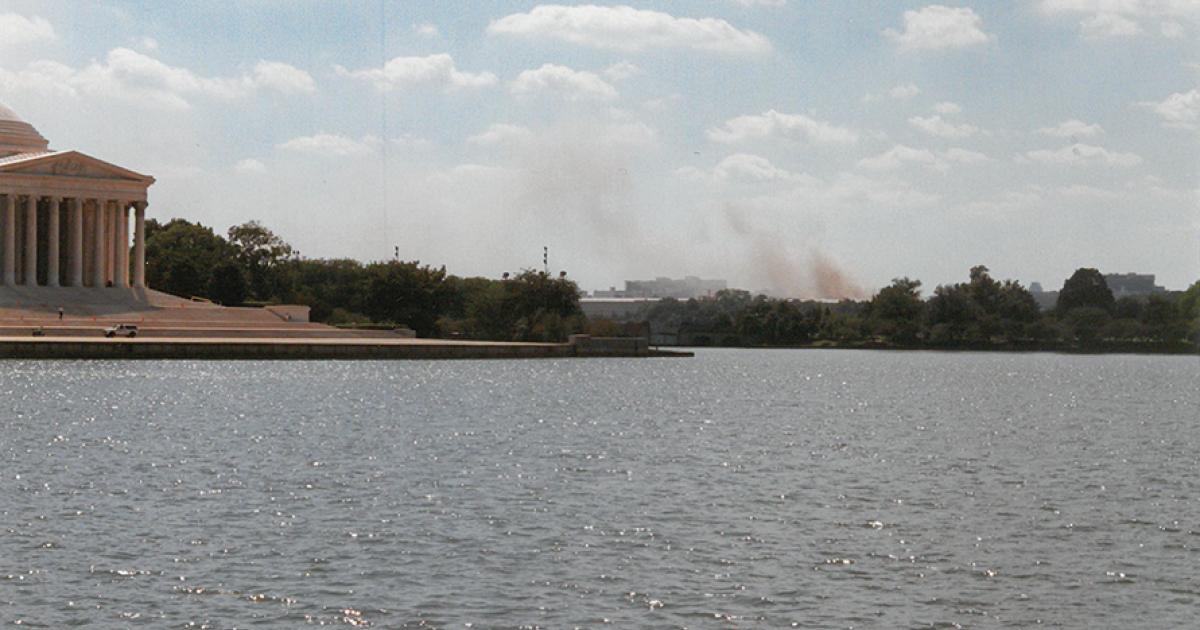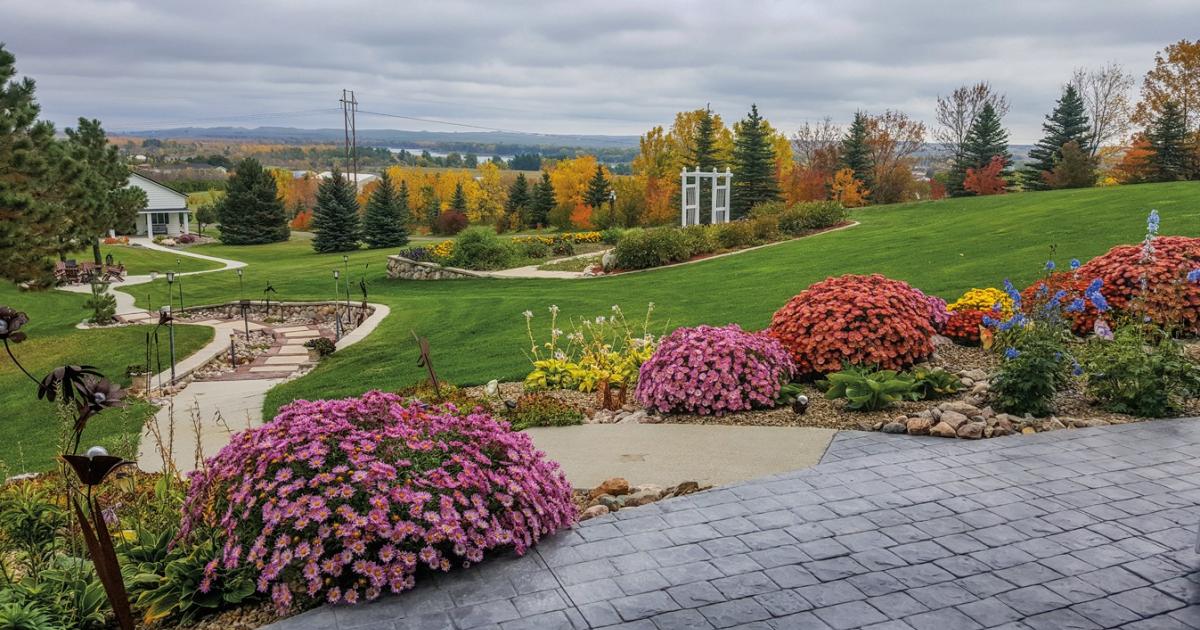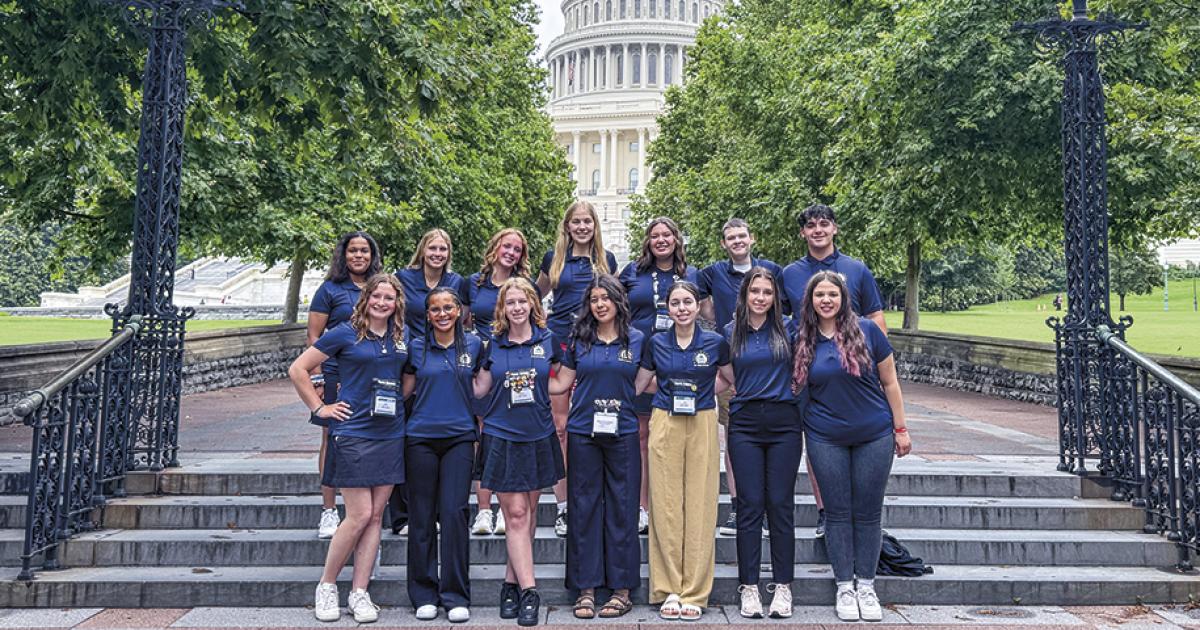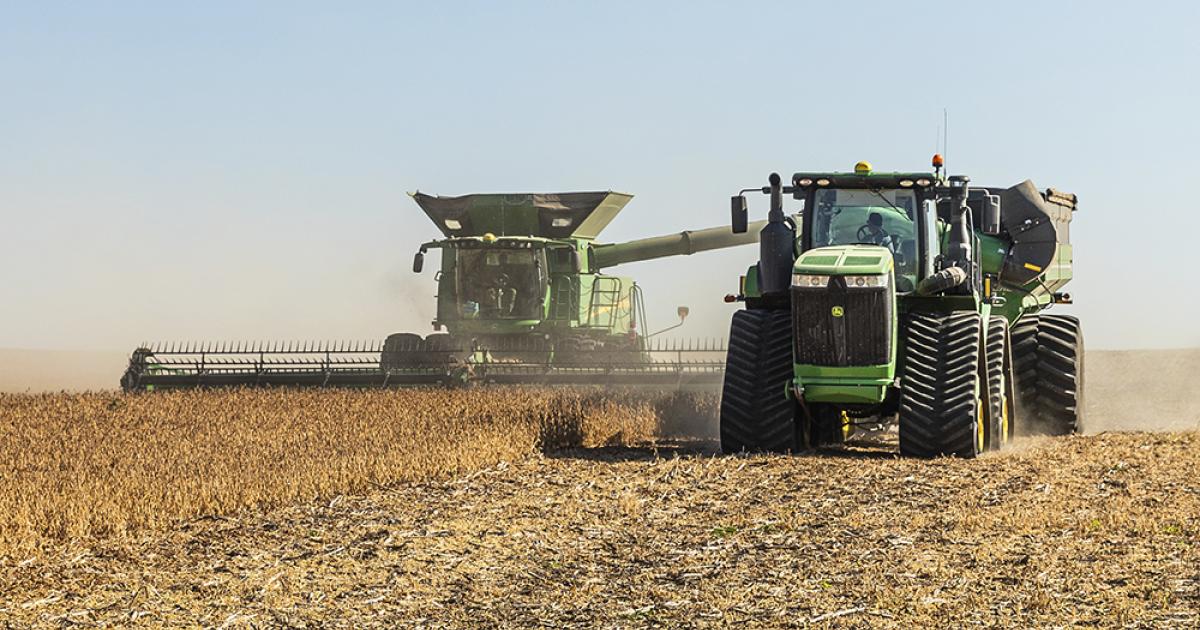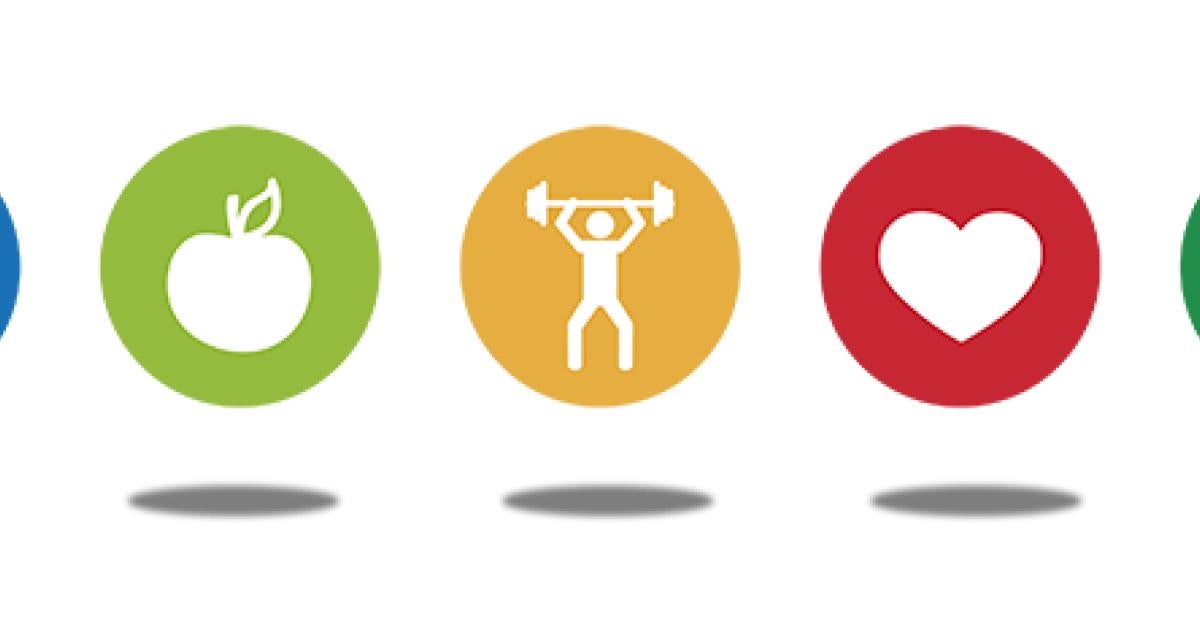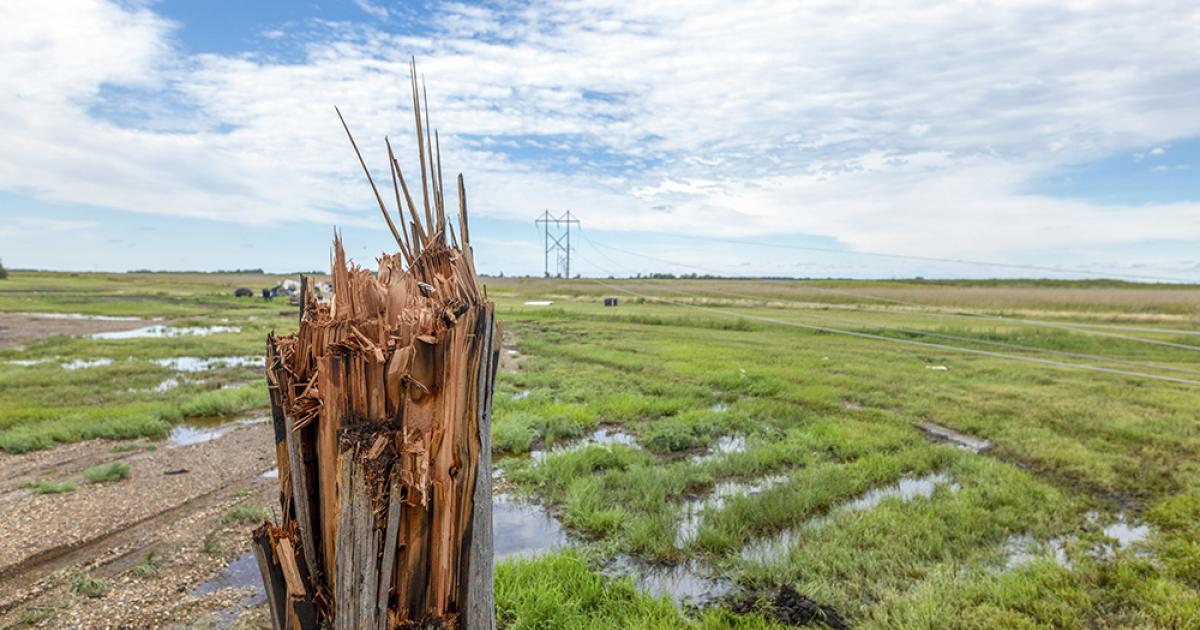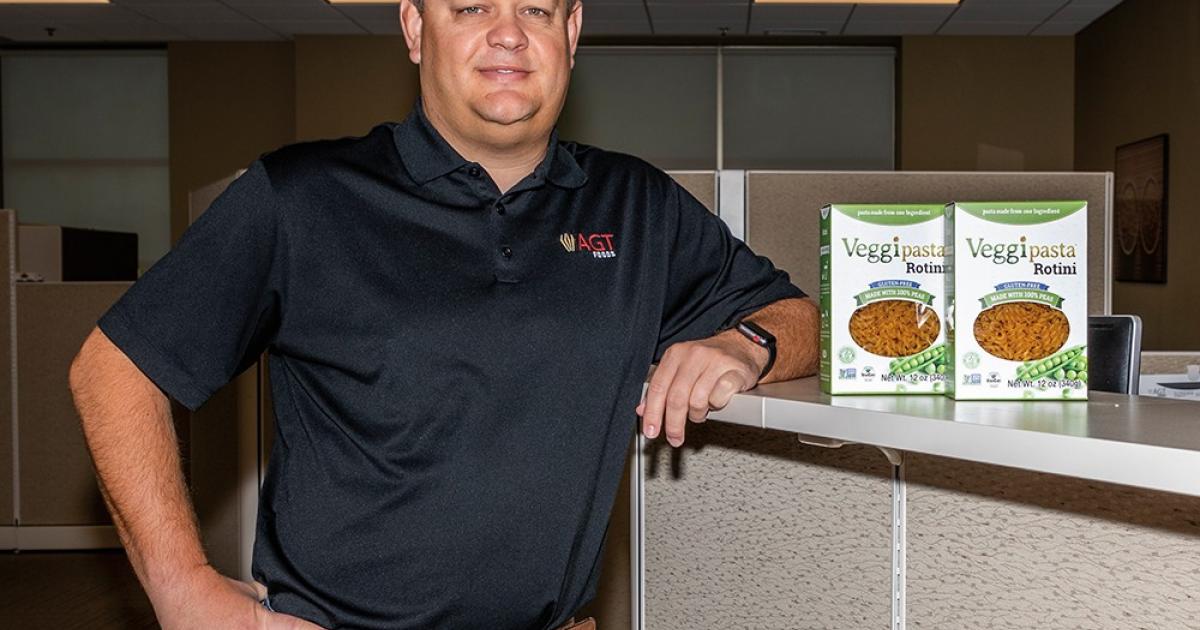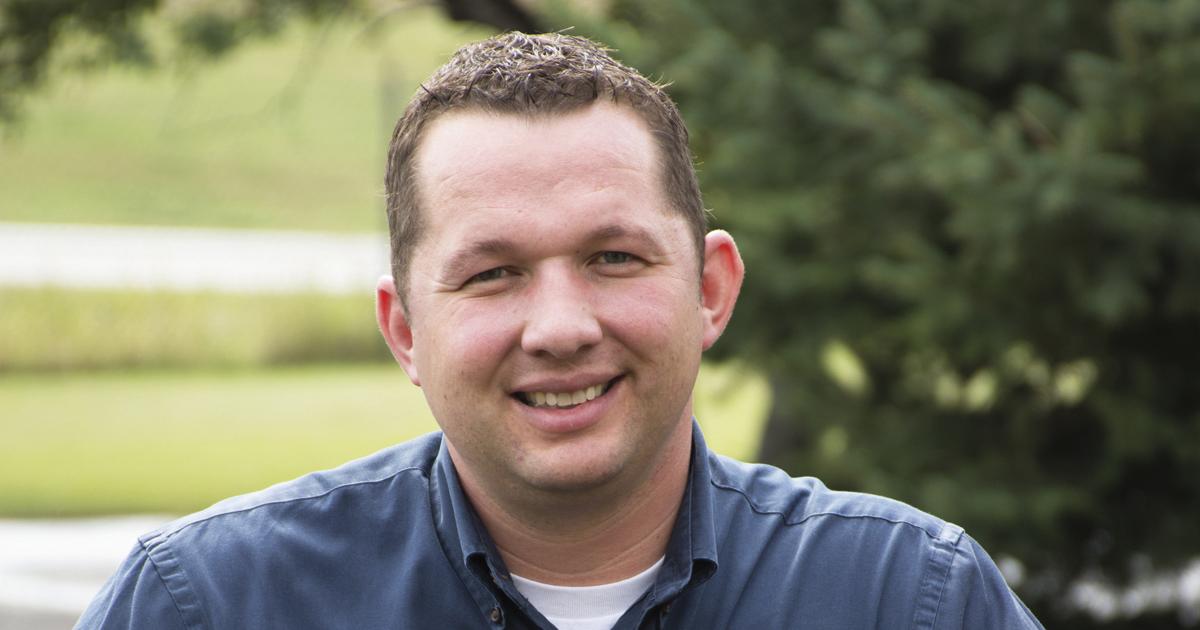North Dakota Living editor Cally (Musland) Peterson plays pinochle with Farmers Union member Jim Storhoff on the bus ride home from Washington, D.C., following the 9/11 attacks.
Dear Journal,
I am writing to you now at 5:21 p.m. I finally calmed down and quit crying. I am so scared. I don’t know when and if I’m going home. I’ll tell you about this hectic and tragic day in America.
We woke up and were happy, go-lucky people. We got ready and went to the gift shop to get Ray (Bardell) a present, because it is his birthday today. We bought him a golf ball and a funny card.
After we did that, we went to McDonald’s and got some bacon, egg and cheese biscuits with orange juice. There was a man asking for money, and my mom didn’t give him money, but bought him food. She bought him food, because if we gave him money, he might of bought drugs.
We then were walking to the Cannon Building. The Cannon Building is right across the street to the side of the Capitol. We were just turning the bend to get to the meeting and there were people running and screaming and yelling, “Get away from the Capitol.”
My mom and I didn’t know what was going on. We just knew about the Trade Center building and didn’t think much of it. We then saw the police officers waving everyone to leave and run anywhere away from the Capitol.
My mom thought it was a sniper shooting at the Capitol and said we should hide in these bushes. With her idea, I thought she had lost her mind. I said, “Fine, but I’m leaving.” I started running and then she came, too.
She told me to go in the Rayburn Building, so I did. We asked the security guard what was going on while everybody was yelling at her asking her questions. She told us how bad the Trade Centers were and also told us there were two more planes hijacked – and told us to run home.
We ran to the hotel, almost getting killed with all the traffic. We got to the hotel, and everybody was watching the lobby TV. We watched it, too, and found out a hijacked American Airlines plane hit the Pentagon. There was one more plane in the air, but thank God someone or something made that plane crash in a small county in Pennsylvania.
We also found out that there were four total hijacked planes, two American Airlines and two United Airlines, with all together about 300 people on the airplanes killed. They think it was either a suicidal thing or a man from the Pakistan area named Bin Laden planned it.
There was also an unusual story that a lady on the American Airlines plane that hit the Pentagon was an important lady that was a national prosecutor, and her husband is the solicitor general. The hijackers moved everyone on that plane to the back, and she asked if she could go to the bathroom. She called her husband on the cellphone, and they were talking to her when they heard a boom. That was either them crashing or the hijackers killing her.
There was an estimated 100 people killed in the Pentagon. There are three buildings down so far.
It is 6:05 right now.
When I was running, I felt like I was in the movie, “Godzilla.”
Will close until further information.
We then went downstairs for a reception and had meatballs and potatoes and fruit. At about 7:15, we went back to the hotel room and called Erin and talked to just her, because Cole and Dad were taking Macy for a walk.
Then we watched TV for one hour and a half. Then we brushed our teeth, and prayed, and went to bed.
Sweet dreams (hopefully).
Cally L. Musland, 11 years old
I was 11 years old on Sept. 11, 2001. A sixth-grader in Mrs. Mathson’s class at Gussner Elementary in Jamestown.
The morning of 9/11, I was across the street from the U.S. Capitol in Washington, D.C., where I was accompanying my mom, Pam Musland, and a delegation of farmers and ranchers from North Dakota Farmers Union to lobby Congress “to pass a new farm bill that covers the cost of production,” as described in my Sept. 7, 2001, journal entry. I guess much hasn’t changed on that front. Twenty years later, we’re still fighting for that farm bill.
Seemingly everything else, however, has changed. It had to.
EVERY LITTLE DETAIL
Sept. 11, 2001, is my generation’s Pearl Harbor. We remember where we were or what we were doing when the news of the 9/11 terrorist attacks on American soil reached us. My classmates will remember TVs on carts being rolled into the classroom and my dad stopping to tell them, “Cally is OK.”
Twenty years later, I can still remember every little detail from that day.
The little TV setting atop the beverage cooler in the hotel quick-service restaurant, where we first saw footage of the World Trade Center attacks in New York.
The man down the street outside a McDonald’s that Mom got back in line to order a sausage McMuffin for, only after kindly asking, “Ma’am, can I have two?”
The high-heeled shoe on the sidewalk someone had left behind in the chaos of the Capitol Hill evacuation.
The calm and honest tone of the Capitol Police officer who told us to “go home” for our own safety, while she stayed behind.
The person who told us to “look up” as we fled for safety and smoke arose from the Pentagon in the distance.
The journalist in my mother, who left me safely in the care of Farmers Union members Duane and Phyllis Gronfur to return to the chaos, documenting and photographing the scenes. And the somewhat photographic memory in me, recalling the numbers my mom’s fingers dialed to reach our landline at home using her toll-free number at work.
The relief in my dad’s voice when he picked up our home phone, having left work to try to reach us and take my siblings out of school, and heard my voice. “How did you get through?” he asked, knowing the phone lines were full in this early cellphone era. And the concern when I answered his next question, “Where is your mother?”
Being glued to the TV over the next several days, watching our heroes in the aftermath of the attacks and witnessing the countless acts of bravery displayed by first responders and ordinary citizens alike.
Listening intently as the shopkeeper turned up the radio in a Union Station store days after the 9/11 terrorist attacks to hear President George W. Bush declare a War on Terror.
A NEW WORLDVIEW
Overnight, my world – and worldview – changed. I was suddenly reflecting on a “hectic and tragic day in America,” learning about suicide missions, places like the Middle East, and people far removed from me and my life in North Dakota.
Until a few months ago, it had been years since I read the journal from my Washington, D.C., trip. After a half-day search mission of my parent’s home, my dad recovered the journal from a photo album in an attic.
The first reading moved me to tears.
Perhaps part of my emotion was long-tucked-away fear by an 11-year-old me, pinpointing the moment when my childlike notion of safety shattered. Or maybe it was the words themselves. In the days leading up to Sept. 11, 2001, my journal was filled with descriptions of the food we ate and excitement for the sites we would see in our nation’s capital. Every day ended the same: “We brushed our teeth and went to bed.” But on 9/11, “We brushed our teeth, and prayed, and went to bed.”
As vivid as that day remains for me, I can equally remember the unity that defined our nation in the days and months following 9/11. We were now a nation at war. Half a world away – but in a world that seemed much larger now – our sons and daughters would find those who attacked us. In devastation and crisis, we came together to support one another.
The last few entries in my journal detail the bus ride home to North Dakota, which included a lot of pinochle and even a handmade “Jeopardy!” game. I guess we all found a way to support each other, too. Farmers Union members Allen Lund and Woody Barth were the contestants, and apparently, I thought it was “so hysterical!” Allen beat Woody, $1 to nothing.
My last journal entry from Sept. 15, 2001, doesn’t make mention of brushing our teeth and going to bed. There were far more important things to do.
“We woke everyone up and gave them hugs.”
Cally (Musland) Peterson is editor of North Dakota Living. She can be reached at cpeterson@ndarec.com.
LIVES LOST
The Sept. 11, 2001, terrorist attacks killed 2,977 people and injured thousands more at the World Trade Center in New York City, the Pentagon in Washington, D.C., and in Somerset County, Penn. Three North Dakotans perished in the World Trade Center attacks: Al Marchand, Ann Nelson and Robert Rasmussen.
America’s longest war took the lives of 2,448 American service members in Afghanistan and injured thousands more between Operation Enduring Freedom from 2001-2014 and Operation Freedom’s Sentinel after 2014. Seven North Dakota service members were killed fighting terrorism in Afghanistan: Spc. Keenan A. Cooper, Cpl. Nathan J. Good Iron, Spc. Chris Kleinwachter, Sgt. 1st Class Darren M. Linde, Spc. Curtis R. Mehrer, Spc. Tyler J. Orgaard and Sgt. Travis A. Van Zoest.
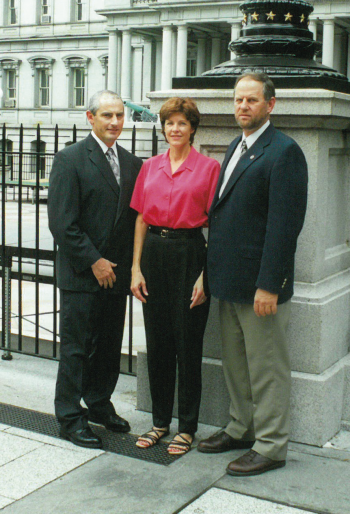 |
| Neal, Mary and Richard Schlosser, of Edgeley, were participating in a National Farmers Union legislative lobbying effort when the Pentagon was struck by terrorists on Sept. 11, 2001. This photo was taken at the Old Executive Office Building the day before the attack. |
EDGELEY COUPLE RECALLS 9/11 TERRORIST ATTACKS
On Sept. 11, 2001, Richard and Mary Schlosser, members of Dakota Valley Electric Cooperative (DVEC), were in Washington, D.C., with a contingency of 47 North Dakotans lobbying for farm policy changes on the annual National Farmers Union fly-in. They watched the footage of the World Trade Center attacks alongside congressional staffers in the Rayburn House Office Building.
“I remember being in the congressional offices and seeing all of the staffers staring at the screens, as the planes flew into the World Trade Center,” Mary recalls. “As information kept coming in, what struck me was the fear of the unknown. We didn’t know who we should be afraid of or where it was going to strike next.”
“Here we are, in the Capitol of the United States, a symbol of safety and one of the most guarded places in our country. You felt safe,” Richard says, who was a DVEC director at the time. “Then, all of a sudden, it got turned on its head. People are running down the street. We were vulnerable.”
While it was a frightening time for the Schlossers, they acknowledge the fear felt by families back home. Richard and Mary’s youngest daughter, Emily, tearfully waited for news from D.C. at school in Edgeley.
“Everybody was worried that their family was safe,” Mary says. “The phones were clogged. We were trying to reach Edgeley and they were trying to reach us.”
It wasn’t until later that evening the Schlossers’ call home finally went through.
“I think people back home were more concerned and everyone was on high alert,” Mary says. “Once we were all back at the hotel and safe, with our Farmers Union family, you felt better.”
Richard and Mary have both been back to Washington, D.C., following the attacks on Sept. 11, 2001. Security and safety measures implemented following 9/11 have changed the lives of all Americans. The changes, Richard says, are a good thing.
“I knew things would have to change,” he says. “I’m glad folks stepped up, that we practice precautions and prioritize safety. Things changed dramatically, but you adapt.”


